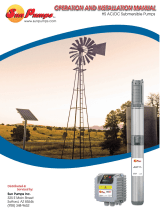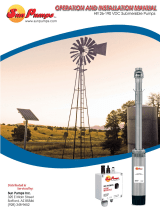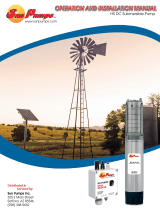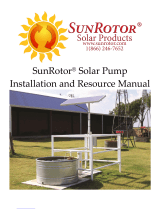Page is loading ...

1

2
Table of Contents
1. Introduction to HR AC/DC Submersible Pumps 3
2. Safety Instructions 4
3. Storage Conditions 5
4. Packing Content 5
5. General Technical Features 6
6. Pump Installation 7
6.1 Installing Pump in the Well 7
6.2 Installing Pump in a Solar Pumping System 8
6.3 Pump Cable 9
7. PV Panels Number & Wiring 9
7.1 CM MP & Pump Wiring Diagram 10
8. Troubleshooting 11
Phone (928) 348-9652 Fax (928) 348-9653

3
1.0 Introduction to HR AC/DC Submersible Pumps
HR AC/DC is a range of 4” submersible pumps for clean water composed of:
• Three phase permanent magnet motor.
• Built-in inverter.
• Helical rotor pump.
Pump inverter allows:
• Modification of the pump speed. In this way the pump is operated only
when needed, thus avoiding unnecessary waste of energy and granting
longer system life.
• Soft start and stop, which increases the system longevity.
• Motor protection from overloading, dry running, overvoltage, under-
voltage, and possible abnormal conditions.
HR AC/DC can be used in residential or commercial pressurized systems providing:
• Energy savings.
• Quick and simple installations.
• Long life reliability.
HR AC/DC Pumps have a wide margin of operating voltages (90-265 VAC or 90-400
VDC). This means that the same pump can be powered by photovoltaic panels, by
generators, or by AC grid power batteries with inverters. The motor will adjust
automatically according to the power that is available.
In panel-direct systems, an MPPT (Maximum Power Point Tracking) algorithm is
used to adjust for various conditions of sunlight and temperature. This allows the
maximum amount of water to be pumped with your system.
Pump speed is adjusted in relation to solar irradiation. When solar irradiation
increases, the pump will run faster, thus pumping more water. When solar
irradiation decreases (clouds or twilight), the pump will reduce its speed and will
continue to pump until solar irradiation drops below safe pumping conditions.
HR AC/DC pumps can be installed with or without a controller. There are two
controllers to choose from, the STOP Module and the CM MP Control Module.
The HR STOP Module makes it possible to start and stop the pump by push-button
or to control the operation of the pump with a float switch or pressure switch. It
also protects the pump from voltage spikes.

4
When installed, the Control Module (CM MP) monitors and records:
• Total run time.
• Input voltage, current and power.
• Alarms: dry running, overload, overvoltage.
• Four digital inputs make it possible to connect a float switch, a pressure
switch, start and stop signal, etc...
• Running and alarm status are given by two digital outputs.
Controller Features:
• Analog inputs are used to connect sensors (i.e. flow meter).
• The pump output flow rate can be adjusted to meet the well production.
2.0 Safety Instructions
Sun Pumps strongly suggests reading the operation manual carefully before using
and installing its products. Any operation (installation, maintenance and repair)
must be carried out by trained, skilled, and qualified personnel. Failure to observe
and follow the instructions in this manual may result fatal in dangerous electric
shock.
Use an appropriately rated disconnect between your power
supply and the pumping equipment.
Disconnect the unit from the power supply before
performing any maintenance.
The pump and the pumping system must be grounded
properly before operation.
Do not start the pump for any reason if not completely
immersed in water.
Avoid any shock or serious impact during transportation.
Damage due to transportation, incorrect installation, or improper use of the
device will void the warranty. Sun Pumps cannot be held responsible for any
damage to people and/or property due to use of its products.

5
3.0 Storage Conditions
Store the product in its packaging in a dry and well-ventilated environment within
a temperature range from -4° F to 123° F.
If the pump remains in storage for more than a year, it is recommended that you
disassemble the rotating parts and test their functionality and connect the motor
to power (without running the motor) to allow charging of the electrolytic
capacitors in the inverter module.
If the pump has already been put into operation and is then placed in storage, the
minimum storage temperature is 40° F.
4.0 Packing Content
Packing includes:
• HR AC/DC submersible pump with 8 feet flat cable length.
• Operating Manual.
Check the packing immediately upon delivery and check for
damage and/or missing parts; in either case, immediately
notify the supplier
When powering the pump and Control Module with a
genset, it is recommended to use only generators with
electronic voltage regulators. Connect (or disconnect) the
pump and the Control Module to generator only when the
generator has reached stable operating and voltage output.
Do not lower the pump into the well using the electric
cable.

6
5.0 General Technical Features
HR AC/DC PUMP
Power supply
90-400 VDC; 90-265 VAC
Max. temperature of pumped liquid
92° F
Min. speed of water flow on motor
case
.65 f/s
Characteristics of pumped liquid
Clean, non-corrosive, non-explosive,
free of particles and fibers, with a
maximum sand content of 50 g/m
3
Grade of protection
IP68
Used materials
Pump and motor body 304 stainless
steel AISI
Cable
Flat cable ACS – KTM - WRS approved
CM MP CONTROL MODULE
Power supply
90-400 VDC; 90-265 VAC
Max. ambient temperature
140° F
Grade of protection
IP55 (NEMA 4)
Used materials
Aluminum, LCD membrane with PVC
stickers, antipull plug in polyamide
Analog input
2 x analog input 4-20 mA + 2 settable
analog input 4-20 mA or 0-10 V.
Digital input
4 inputs, N.O or N.C settable via
software
Digital output
2 output relays 5A, 250 VAC, N.O or
N.C settable
Auxiliary feeding
15 VDC (300 mA), 10 VDC (5 mA)
User display
Backlit LCD display with 16 characters x
2 rows, 5 buttons, buzzer for acoustic
Dimensions
7 x 7 x 4.72 In.
Short circuit protection
With fuse
CERTIFICATIONS
CE

7
6.0 Pump Installation
Entire installation procedure must be performed verifying
that pump is not connected to the power supply.
Pump can be installed both
vertically and horizontally, but
the outlet should never be below
the horizontal line.
If the pump is not installed in a
well, to provide proper cooling, a
cooling sleeve must be used.
6.1 Installing Pump in the Well
The pump must always be secured in the well with a safety rope attached to it. Do
not lower the pump into the well using the electric cable. Attach the electric cable
to the drop pipe about every ten feet.

8
6.2 Installing Pump in a Solar Pumping System
HR AC/DC pumps can be installed with or without a pump controller, so overload
protection, overvoltage, and dry running protection are all integrated into the
motor itself. However, there are two controllers to choose from if you need
additional features, the STOP Module and the CM MP Control Module.
The HR STOP Module makes it possible to start and stop the pump by push-button
or to control the operation of the pump with a float switch or pressure switch. It
also protects the pump from voltage spikes.
If the CM MP is used, it is possible to:
• Control the current, power, and voltage.
• Record and store all the alarms related to the pumping hours.
• Connect a pressure or a flow sensor to control the pump.
• Connect a pressure or a float switch.
• Provide an alarm digital output for remote control.

9
6.3 Pump Cable
HR AC/DC pumps are equipped, in their standard configuration, with 8 feet flat
cable length.
HR AC/DC pump communicates with CM MP (surface control
module) (if installed) by signal wires. If CM MP is not
installed, it is recommended to short-circuit and insulate
signal wires with a splice kit, or to extend the wires to the
surface to be closed by an external switch.
7.0 PV Panels Number and Wiring
The power rating of the selected pump (P1) defines the total power of the PV
system to be adopted. The photovoltaic panels are characterized by:
• Rated power (Pmax)
• Rated voltage (Vmpp)
• Rated current (Impp)
• Open circuit voltage (Voc)
The panels are connected in series until the total open circuit voltage (Voc x n.
Panels) do not exceed the voltage limit of the pump (400 VDC). If additional panels
are connected, they will need to be wired in parallel.
Do NOT connect AC or DC power to
the red and white signal wires or it
will damage the pump and it will
not be covered by warranty.

10
7.1 CM MP & Pump Wiring Diagram
Pump Communication Wires

11
8.0 Troubleshooting
If after the installation and power is connected, the pump doesn’t provide any
water, please verify:
• Correct wiring.
• Voltage supply (90-265 VAC; 90-400 VDC). If the voltage is too high the pump
will stop immediately and will attempt to restart in 10 seconds.
• Enough power is available (solar irradiance): if the solar power is too low to
start the pump, the pump will stay in standby and try to start again in 4
minutes.
• Water level: if pump runs dry during operation, an alarm occurs and the pump
will stop. Every 5 minutes, pump will attempt to restart.
• Water temperature and motor cooling conditions: if the temperature is too
high (or motor cooling too low) the pump will stop automatically. It will
attempt to restart after 7 minutes.
• Motor overloading: if the motor is overloaded the pump will ramp down and
stop automatically. It will attempt to restart after 30 seconds, up to a
maximum of 5 retries in 10 minutes. After 5 failed attempts, the pump will
wait 10 minutes before attempting to restart.
• Electronics overloading (firmware trip): If the integrated electronics are
overloaded, the pump will stop immediately. It will attempt to restart after
30 seconds, up to a maximum of 5 retries in 15 minutes. After 5 failed
attempts, the pump will wait 15 minutes before attempting to restart.
• Electronic overloading (hardware trip): If the integrated electronics are
overloaded, the pump will stop immediately. It will attempt to restart after
30 seconds, up to a maximum of 3 retries in 60 minutes. After 3 failed
attempts, the pump will wait 60 minutes before attempting to restart.
• Loss of motor control: If there is a loss of motor control, the pump will stop
immediately and will attempt to restart in 3 minutes.
• Locked rotor: if the rotor is locked or high current load, the pump will ramp
down and stop automatically. It will attempt to restart in 6 minutes.
/







